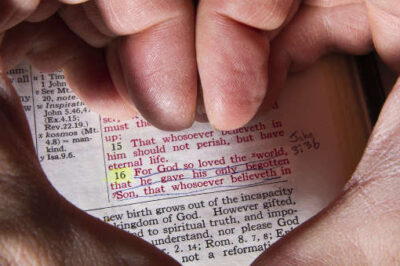As we grow in prayer, we experience more of the love that has burned in God’s heart from eternity past. The ultimate reality of the kingdom is the burning love that has existed within the fellowship of the three persons of the Trinity from before the creation of the world.
God is love. His very being is wholehearted love (1 John 4:16). In other words, the essence of how God thinks and feels flows from His heart of unwavering, passionate, infinite, wholehearted love. There is a perpetual “volcanic explosion” of intense love among the three persons of the Trinity.
The Father, Son, and Spirit are each fully satisfied in the fellowship of the Trinity. But the joy of love compelled the triune God to create beings who could share their love. Love demands expression; thus, it must be shared and multiplied. God wanted others to experience the joy of the Trinity’s perfect love.
Love is the foundation of our relationship with God, the essence of salvation, and the key to understanding how to pray. The call to participate in the fellowship of the burning heart that exists in the relationship among the persons of the Godhead is the cornerstone of the call to prayer.
One foundational premise in Scripture is that God loves us with the same intensity with which God loves God. Impossible as it seems to us weak and sinful mortals, it’s true. Jesus declared to His disciples (and by extension, to us), “As the Father loved Me, I also have loved you; abide in My love” (John 15:9).
The love burning in God’s heart has at least five expressions. First, God loves God—the Father, Son, and Spirit love each other with fiery love. Second, God loves His people with all His heart and strength. Third, our love for God springs from His love imparted to us. Fourth, God’s people love themselves in God’s love and for God’s sake. Finally, God’s people love one another in the overflow of the love that we receive from God. Together these five expressions of love constitute what I call “the fellowship of the burning heart.” We are invited to enter into the relationship of burning love that is shared within the fellowship of the Trinity. What a glorious destiny! This radically changes how we view our lives and how we understand salvation.
1. God’s love for God. The first expression of perfect love is found in the relationships within the Trinity. The Son loves the Father (John 14:31), and the Father loves the Son
(John 3:35; 5:20; 15:9; 17:23). Each person of the Trinity loves the others with
all their heart, mind, and strength.
I fully embrace the truth of the Trinity as commonly taught throughout church history. There is one God who forever dwells in three distinct, divine persons. They are coequal in that the Father, Son, and Spirit each fully possess all God’s attributes, while they differ in function and authority in work.
The way God loves within the Trinity is the same way—the only way—He loves us. He cannot love partially; He always loves in fullness and wholeheartedly. His love neither diminishes nor grows because it is infinite in measure and eternal in duration. He never loves us with just part of His love—that would be to deny His own character.
2. God’s love for His people. It is a cause for much rejoicing that God’s love does not end with Him but is poured out on and imparted to human beings. Jesus loves the redeemed with the same intensity of love with which the Father loves Him: “As the Father loved Me, I also have loved you; abide in My love” (John 15:9). The Father loves the redeemed with this same intense love, as we see from Jesus’s prayer to Him “that the world may know that You . . . have loved them as You have loved Me” (John 17:23).
3. Our love for God. The Pharisees sought to trick Jesus with a question. One day, in response to their question about which was the greatest commandment in the law, Jesus implied that wholehearted love for God was to be the first priority in our lives: “You shall love the Lord your God with all your heart, with all your soul, and with all your mind. This is the first and great commandment” (Matt. 22:37–38). We see from these verses that the Holy Spirit’s first agenda is to establish the first commandment in first place in us. This is the highest priority of God’s activity in His kingdom. It is the first call for every believer.
4. Our love for ourselves. The redeemed are to love themselves in God’s love and for God’s sake. We love ourselves through the lens of the revelation of Jesus, His cross, and our great worth to Him.
In His reply to the Pharisees about the greatest commandment, Jesus told them that the second commandment was like the first: “And the second is like it: ‘You shall love your neighbor as yourself ‘” (Matt. 22:39). Clearly we must love ourselves in order to fulfill this command. In fact, we will never love others more than we love ourselves in the grace of God. The task is made easier when we are able to see ourselves as God sees us.
5. Our love for others. If we receive God’s love and love Him in return, then it is only a matter of time before we will begin loving people more deeply. The same love that burns within the fellowship of the Trinity will flow from us toward others. We are to love others in the overflow of God’s very own love. Jesus Himself gave us the command to “love one another as I have loved you” (John 15:12). Our loving others as Jesus loves us is a dynamic expression of the fellowship of the burning heart.
The Lord wants us to enter into how He feels about others because He knows having His heart will change the way we see people and how we respond to them. We can love even fellow believers who mistreat us because God loves them just as He loves us (John 15:9). We will delight in one another in the same way in which God loves and delights in all His people. Moreover we will be empowered to extend our love for others beyond the people who enjoy the same things we do, beyond those who are popular, and beyond those who are powerful and can enhance our status. We will love all God’s people with His love.
Understanding the five expressions of God’s love will change the way we view God, ourselves, and other people and will help us to pray more effectively. Our goal should be to pray effective prayers that allow us to partner with God in bringing His kingdom to Earth.
The preceding is an excerpt from Growing in Prayer (Charisma House, 2014) by Mike Bickle. Copyright © 2015 by Mike Bickle. All rights reserved.
Mike Bickle is the director of the International House of Prayer of Kansas City and the founder of International House of Prayer University, a four-year ministry school. He is the author of several books, including Passion for Jesus, Growing in the Prophetic, The Pleasures of Loving God and After God’s Own Heart.






Leave a Comment
You must be logged in to post a comment.